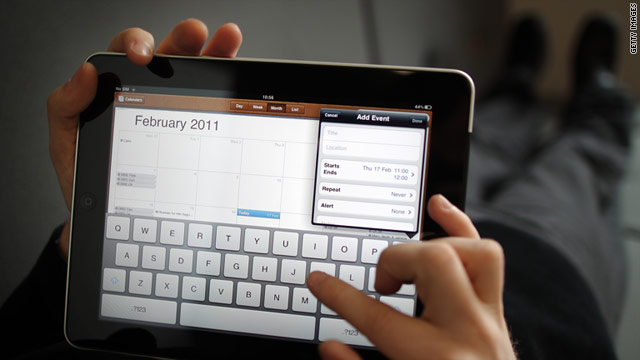 By WIRED via CNN.com: "When Steve Jobs introduced the iPad last January, the biggest surprise wasn't the actual product. (Many shrugged and called the iPad a 'bigger iPhone.') It was the price: Just $500.
By WIRED via CNN.com: "When Steve Jobs introduced the iPad last January, the biggest surprise wasn't the actual product. (Many shrugged and called the iPad a 'bigger iPhone.') It was the price: Just $500.Nobody expected that number, perhaps because Apple has traditionally aimed at the high end of the mobile computer market with MacBooks marked $1,000 and up. And perhaps we were also thrown off because Apple execs repeatedly told investors they couldn't produce a $500 computer that wasn't a piece of junk.
But Apple did meet that price, and the iPad isn't junk. The iPad is still the first, and best-selling, product of its kind. Competitors, meanwhile, are having trouble hitting that $500 sweet spot.
Motorola's Xoom tablet is debuting in the United States with an $800 price tag. (To be fair, the most comparable iPad is $730 -- but there's no $500 Xoom planned, and the lack of a low-end entry point will hurt Motorola.) Samsung's Galaxy Tab, with a relatively puny 7-inch screen, costs $600 without a contract.
Why is it so hard to get to a lower starting price? And how was Apple able to get there?
Jason Hiner of Tech Republic suggests it largely has to do with Apple's retail strategy. Apple now has 300 retail stores worldwide selling iPads directly to customers. That's advantageous, because if the iPad were primarily sold at third-party retail stores, a big chunk of profit would go to those retailers, Hiner reasons.
Apple has partnered with a few retail chains such as Best Buy and Walmart, but those stores always seem to get a small number of units in stock. Hiner rationalizes that the true purpose of these partnerships is probably to help spread the marketing message, not so much to sell iPads.
'The company can swallow the bitter pill of hardly making any money from iPad sales through its retail partners because it can feast off the fat profits it makes when customers buy directly through its retail outlets and the web store,' Hiner says. 'However, companies like Motorola, HP, and Samsung have to make all of their profit by selling their tablets wholesale to retailer partners.'
- Sent using Google Toolbar"
No comments:
Post a Comment